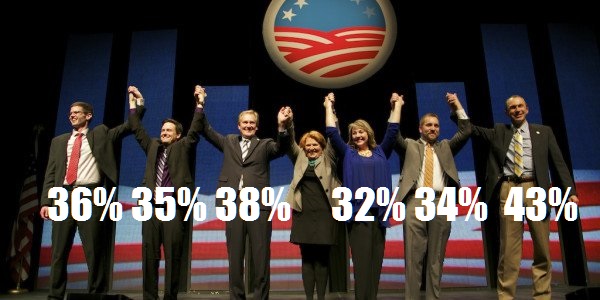It's Time North Dakota Democrats Did Some Serious Soul Searching

Allow me to begin my analysis of tonight’s election results with some context.
In boxing, top-ranked fighters don’t like to take on bouts with lower-ranked fighters because there’s no upside for them. If they win, they get no credit, because they were supposed to win. If they lose it looks terrible, because they were supposed to win.
That’s the position North Dakota Republicans find themselves in these days. They’ve been in charge in the state for so long, by such enormous margins, that at this point they’re just expected to win everywhere all the time. And if Democrats manage to pick up a race or two here and there, suddenly they look like big winners.
The spin from Democrats about tonight’s results (when they’re not complaining about the new voter ID laws, more on that later) will focus on a couple of seats they peeled away from Republicans after hard-fought races. But that’s some pretty thin gruel.
Tonight Republicans held on to every single seat on the statewide ticket, including two incumbents who won despite being plagued by scandal. Republican Ag Commissioner Doug Goehring confessed to calling women on his staff his “harem,” and he won. Incumbent Tax Commissioner Ryan Rauschenberger spent a month of the campaign season in rehab for alcohol addiction, and he’s currently got 56 percent of the vote, roughly 20 points more than his opponent Jason Astrup.
As of the time of this post, with 91 percent of precincts reporting, only one Democrat had managed to get more than 40 percent of the vote on the statewide ticket. That was Ryan Taylor, who is still losing to Goehring by more than 13 percentage points 43-56. Kiara Kraus-Parr, who ran against Wayne Stenehjem for Attorney General, got just 25 percent of the vote.
That’s abysmal. That’s so bad it’s hard to find words to describe how bad that is. “Marginalized” is close. “Irrelevant” is closer. Which isn’t good for Republicans. The party has become so used to winning that their “ground game” in the state to get out the vote was basically non-existent. On this point, the “Republican supermajority” (a term Democrats in the state are fond of) is just leaning on the electorate’s seemingly bottomless distaste for Democrats.
Which isn’t exactly healthy for the NDGOP, long-term, but I digress.
The liberals will take solace in a couple of bright spots in the legislature. District 35 Senator Margaret Sitte, long a bête noire for the left in North Dakota, lost to Democrat Erin Oban. Of course, that victory also cost Democrats north of $60,000, more than they spent on most of their statewide campaigns (certain grumbling Demcorats suggest the money might have been put to getter use elsewhere than helping party Executive Director Chad Oban’s wife win).
The other victory for Democrats tonight was the defeat of Rep. Bette Grande in Fargo. Democrat Pamela Anderson (yes, that’s her name) not only beat out Grande but also got more votes than House Majority Leader Al Carlson. That also cost Demcorats a pretty penny, with over $20,000 invested in Anderson’s campaign.
Tempering these victories is the fact that Democrats also lost an incumbent in Rep. Ed Gruchalla in District 45, which stings for them. Since, you know, that’s like 4.3 percent of their entire House caucus right there.
There are other legislative races we could talk about, but my point is that even when Democrats put their best possible candidate forward (Taylor in the Ag Commissioner race) they lose. When the Republican hamstrings himself with scandal (Rauschenberger in the Tax Commissioner race) they lose. The only races they seem capable of winning these days are a few targeted legislative races that a) cost them a lot of money and resources and b) ultimately mean very little in terms of governing the state.
Maybe it’s time for Democrats to think about why this is happening to them.
Democrats got some momentum in 2012 when Heidi Heitkamp upset Republican Rick Berg in the U.S. Senate race, but I always felt Democrats were putting a little too much stock in that victory. After all, Heitkamp barely held on – by less than 1 percent of the vote – to a Senate seat that Democrats had held since Quentin Burdick won it in 1960.
The liberals in the state saw the upset as evidence of a state ready to turn back the tide on Republicans. In 2014, they got a much different message.




